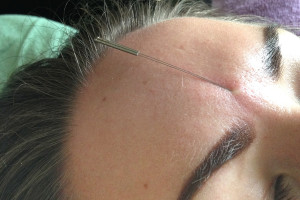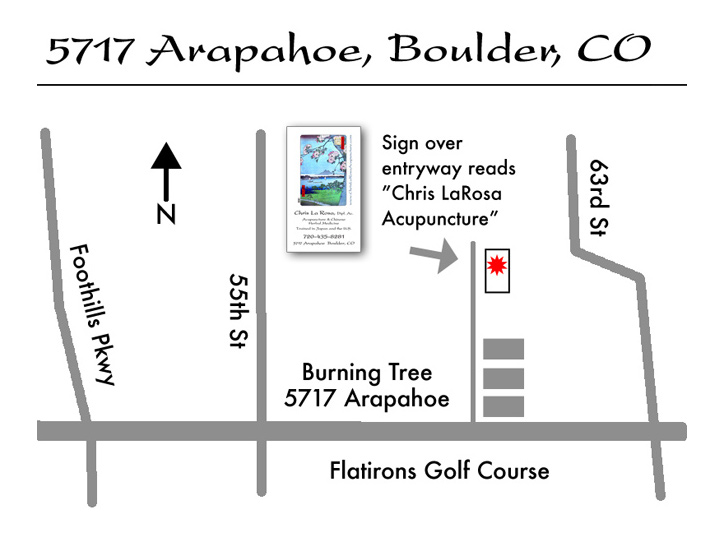Acupuncture for the Treatment of Insomnia:
A Drug-Free Path to Sweeter Dreams
by Chris LaRosa
- Do you experience a sense of helplessness about your insomnia?
- Does your ability to concentrate and think clearly falter?
- Are you plagued by severe mood swings?
Insomnia is one of the most common health complaints following chronic pain and headaches. Insomnia can be defined as difficulty falling asleep or waking up within in the sleep cycle or both. As a nation, the majority of Americans have accrued an enormous sleep debt and it must be repaid. The average person lacks up to an hour and a half of sleep every night. A healthy adult optimally needs six to eight hours of quality sleep. If your peak performance is based upon seven hours of sleep and you receive six hours during the weekdays, you are consequently in a sleep debt of five hours. Sleeping in on weekends replenishes some of that debt, but it does not entirely erase it. Essentially it can take several weeks to replenish the average American’s sleep debt. The toll on our well-being and quality of life is quite significant. Cognitive function falters and the risk of heart disease, diabetes, depression, and high cholesterol increase exponentially with every increase in this sleep debt.

A surprising cause of temporary insomnia is jet lag. After crossing multiple time zones our circadian rhythms are significantly disrupted. Several studies by the National Institutes of Health and World Health Organization, suggest that acupuncture helps restore the body’s natural circadian rhythm in a timely fashion through an increase in serotonin and dopamine levels in the body. Direct-to-consumer advertising places a hypnotic spell on its audience, while concealing many of the nefarious side effects of these sleeping pills. Many people report drowsiness, headaches, “rebound” insomnia, sleep driving, and sleep walking when taking certain pharmaceuticals.
According to a Consumers Union study, 43 million prescriptions for sleeping medication were written in 2005 alone. This appeared in the September issue, 2006 of Consumers Report. A study conducted by Harvard Medical School revealed that Ambien, when compared to a placebo, only reduced the time it takes to fall asleep by twenty minutes after four weeks of continued observation. The amount of time it took to fall asleep ultimately averaged out to five minutes after the dosages were discontinued. Lunesta users lay awake for over three-quarters of an hour before finally falling asleep, and frequently experience another forty-five minutes of wakefulness throughout the night. Furthermore, because of the amnesiac effects of these pharmaceuticals, people believe they sleep better because they often don’t remember being awake during the night.
In Chinese medical theory, insomnia is often contributed to an excess of Yang energy that becomes trapped in the forehead, eyes, and other sensory organs. Yang energy is highly active during the day, facilitating wakefulness and mental clarity, however, at night, Yang energy naturally wanes and returns to the Yin areas of the body. Yang energy peaks mid-day and recedes at nightfall when darkness and Yin energy begin their reign. Blood is another crucial aspect of Yin energy. At night, blood should return to the liver, where it is stored. If blood does not return to the liver for it’s necessary storage, sleep becomes impaired.
Heat is another element that can induce difficulty sleeping and wakefulness throughout the sleep cycle. Waking up earlier than intended is also attributed to heat. Nightmares can also be included in the menagerie of sleep-related difficulties. One way to understand how this paradigm works is to look at the five phases in Chinese Medicine. The heart and lungs house the fire phase and the kidney houses the water phase. Fire has abundant Yang energy that must be checked by water, the kidneys abundant Yin energy. We could see this relationship very much like the radiator in our car, if there is coolant and water, the engine is protected and overheating is held in check. The gentle placement of needles in selected acupuncture points stimulate the release of neurotransmitters such as serotonin and dopamine, which in turn, help balance the Qi and blood in the meridians. Whether acute or chronic, nightmares can be significantly reduced, or even completely eliminated with acupuncture. A young woman under my care was greatly relieved to return to uninterrupted sleep, after suffering for nearly two decades of chronic nightmares.
Japanese acupuncture treats insomnia, nightmares and dream disturbed sleep by regulating the meridians, pathways utilized in acupuncture treatments. If there is an excess of heat, points with a cooling nature are used. Excess heat often manifests as night sweats, a hot sensation in the head, chest, palms or soles of the feet and significant thirst. If the blood is deficient, it means the physical substance is lacking but also other qualities than what Western medicine may not recognize. Blood moistens the skin, hair and nails. Blood also nourishes our tendons allowing for ease in movement. This is exemplified by paleness of the lips, nails or face, anemia, stiffness in a person’s gait, muscle cramps, declining memory, weakness, fatigue, and dizziness.
For blood deficiency, acupuncture points are needled that increase the blood. Moxa, a plant substance that is burned on or above the skin and on the handle of the needle, is also utilized to increase the Blood. If the mind is overactive by an abundance of Yang energy or overthinking, points that facilitate a downward flow are used, which induces a peaceful state. The hallmark of Japanese acupuncture lies within it’s ability to regulate the meridians to resolve insomnia without having to resort to medications that provide transitory relief, at best.
Acupuncture is also a very effective treatment for women struggling with many of the ailments associated with menopause. Many women who suffer from hot flashes are shocked at how quickly these occurrences recede after a treatment. Difficulties sleeping among menopausal women are indicative of excess levels of heat within the body. By needling points with cooling effects, the high levels of heat diminish and peaceful sleep returns once again.
There are other factors that will impact the quality of our sleep. Diet can enhance a good night’s sleep or impair it. The foods that can enhance sleep, such as complex carbohydrates, cheddar cheese, cherries, tart cherry juice and strawberries. These foods make for a wise choice as a late night snack. However, many foods may disturb sleep quality, and should be avoided before bedtime. Several examples of these foods include alcohol, caffeine, sugary foods and refined carbohydrates, as well as red meat. Alcohol exacerbates snoring, sleep apnea, and it interrupts the sleep cycle because it is a Yang substance. Since alcohol causes heat to be stored in the head, it causes wakefulness after individuals initially fall asleep. Meats should be avoided at dinner time because their high protein content causes sleep disturbances by negatively affecting serotonin levels, which increases alertness. Foods that cause gas, heartburn, and indigestion should also be avoided. Several of these include cruciferous vegetables like broccoli, cauliflower, beans, garlic, as well as spicy and fatty foods. A high-carb snack an hour or so before bedtime, in addition to the avoidance of high-protein foods, can make it easier to fall asleep.
For further reading consider:
- Rhythms of Life by Russell G. Fuster and Leon Hreitzman
